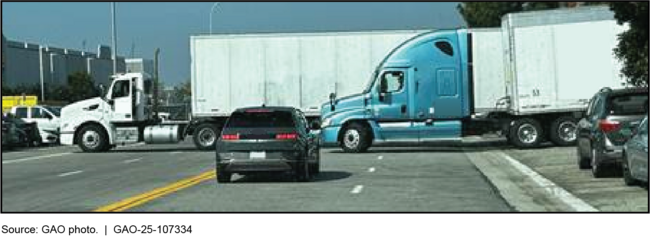Air Cargo: DOT Should Communicate Data Limitations and Identify Stakeholder Challenges
Fast Facts
Shippers use the U.S. air cargo network to transport critical goods like life-saving medicines, electronics, and fresh produce. However, air cargo stakeholders reported that infrastructure challenges, like crowded aircraft parking areas, slowed operations and posed safety risks.
The Department of Transportation is responsible for ensuring that air cargo moves safely and efficiently. But we found that DOT hasn’t communicated with air cargo stakeholders to identify challenges. DOT also hasn’t fully assessed the reliability of some of its air cargo data—which states use for freight planning.
We recommended ways DOT can address these issues.
Crowded parking area for cargo aircraft at one U.S. airport

Multiple large aircraft, cargo, containers, equipment, and a truck occupying the same crowded area.
Highlights
What GAO Found
The Department of Transportation (DOT) is responsible for ensuring the safe and efficient movement of goods, including air cargo. DOT is also responsible for collecting data on air cargo movements and infrastructure locations. While GAO found that some DOT air cargo data were sufficient to describe changes in volume, DOT has not assessed or communicated the reliability of other air cargo data. For example, GAO found that DOT's Freight Analysis Framework air cargo estimates were not sufficient to describe changes in air cargo value and commodities. In addition, DOT has not fully assessed the reliability or communicated the limitations of these estimates. Without doing so, stakeholders may not use the data appropriately for important purposes such as infrastructure planning and incident response.
Selected air cargo stakeholders reported common challenges with ground-based air cargo infrastructure and operations. More than two-thirds of the 37 stakeholders GAO interviewed reported challenges with warehouses, truck areas, and roadways across 11 selected airports. Stakeholders most frequently reported challenges associated with older warehouses, which slowed operations. GAO visited warehouses that were at least 40 years old at four of the nine airports GAO visited, and observed narrow or obstructed space, blocked doors, and low ceilings. Many stakeholders also reported that a lack of truck areas and poorly configured roadways slowed operations and led to safety hazards.
Example of Roadway Congestion Caused by a Truck Docking at an Air Cargo Warehouse

DOT's recently established Office of Multimodal Freight Infrastructure and Policy (Multimodal Freight Office)—which is statutorily required to identify infrastructure improvements and policies to reduce freight congestion—has not taken steps to identify and address air cargo challenges. Specifically, the Multimodal Freight Office has not used existing information, such as freight plans that states share with DOT, to identify challenges. Additionally, the office has not communicated with air cargo stakeholders to understand challenges they face. Doing so would help DOT determine whether it needs to act to help address challenges. Multimodal Freight Office officials said they intended to reach out to freight stakeholders, including for air cargo, within the next year as part of other ongoing efforts.
Why GAO Did This Study
Aviation is critical for the delivery of high-value, perishable, and time-sensitive goods, like pharmaceuticals. Air cargo depends on ground-based infrastructure such as warehouses and roadways to operate efficiently. During the pandemic, cargo congestion and delays at some airports raised questions about the ability of U.S. air cargo infrastructure to support the efficient movement of goods.
GAO was asked to review air cargo trends, challenges, and federal activities. This report (1) evaluates the extent to which DOT has assessed reliability and communicated any limitations of air cargo data, (2) describes challenges selected stakeholders reported, and (3) assesses the extent to which DOT has identified and addressed air cargo challenges, among other objectives.
GAO selected a nongeneralizable sample of 37 air cargo stakeholders, like carriers and ground handlers, across 11 airports that handled 38 percent of 2023 cargo volume, and conducted semi-structured interviews with them about challenges and federal interactions. GAO observed air cargo infrastructure and operations at nine airports and 28 warehouses. GAO also reviewed DOT air cargo data and documents and interviewed officials.
Recommendations
GAO recommends that DOT (1) assess and communicate air cargo data limitations; and (2) evaluate existing information and routinely communicate with stakeholders to identify, and determine if DOT needs to help address, air cargo challenges. DOT agreed with GAO's recommendations.
Recommendations for Executive Action
| Agency Affected | Recommendation | Status |
|---|---|---|
| Department of Transportation | The Secretary of Transportation should ensure that the Director of BTS fully assesses the reliability of air cargo data in the Freight Analysis Framework and National Transportation Atlas Database and communicates the limitations of the data. (Recommendation 1) |
When we confirm what actions the agency has taken in response to this recommendation, we will provide updated information.
|
| Department of Transportation | The Secretary of Transportation should ensure that the Assistant Secretary for Multimodal Freight Infrastructure and Policy evaluates existing sources of information and routinely communicates with air cargo stakeholders, to identify challenges to the efficient movement of air cargo and determine whether the agency needs to take steps to help address the challenges. (Recommendation 2) |
When we confirm what actions the agency has taken in response to this recommendation, we will provide updated information.
|
